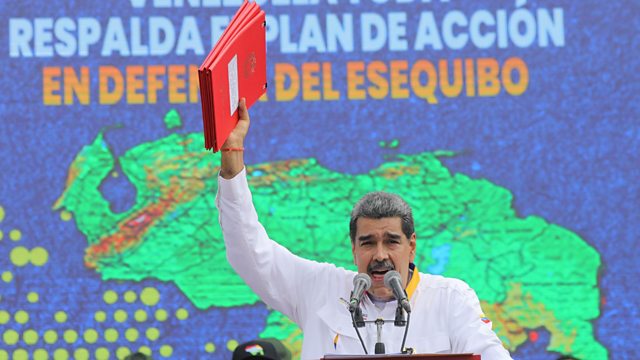16th February 2024
The Government of Guyana has revealed that satellite imagery provided by western allies are showing Venezuelan troop movements along the border in the disputed Essequibo region.
Guyanese authorities including Foreign Minister, Hugh Todd, and Foreign Secretary Robert Persaud have argued that the Venezuelan government under President Nicolás Maduro is violating the Argyle peace accord signed in St Vincent in December 2023.
“We are not surprised at the bad faith of Venezuela. We are disappointed, not surprised. Guyana has a history of entering bilateral discussions in good faith. Unfortunately, we cannot say the same thing about our neighbour to the west,” said Persaud in an Associated Press interview.
This latest escalation comes as ExxonMobil has announced plans to drill and appraise seven new wells within the Stabroek Block in 2024.
“The Liza field, the last time I looked, takes you pretty close to that (equidistant) line. We plan to drill two exploration wells west of Liza and Payara. The Trumpet Fish and Redmoth exploration wells are planned more in the middle of the Stabroek Block during the course of this year so it’s not inhibiting that activity in our plans,” said President of ExxonMobil Guyana, Alistair Routledge.
He revealed that the company intended to allocate approximately US$60mn to US$70mn for each exploration well. However, this expenditure might increase if additional data collection and stem drill tests become necessary.
Days later in a statement, Venezuela accused Guyana of granting illegal oil exploration rights and concessions in “a maritime area that is indisputably Venezuelan,” reserving the right to take any diplomatic action necessary.
“We believe that the contract that we have with the country is valid under the local law…also under international law, we have valid rights to the blocks in which we’re participating,” said Exxon’s Routledge even as he acknowledged that the escalation of tensions in Q4 of 2023 “made a lot of people nervous”.
The statement by Venezuela did not refute the military build-up but asserted its right to strengthen border defences. Vice President, Delcy Rodriguez had earlier asserted that Exxon’s plans are tantamount to a breach of the Argyle Declaration.
The country’s Defence Minister, Vladimir Padrino was more forceful in his response to the drilling plans.
“If ExxonMobil has a private security company represented by the Southern Command, and a unit of the Government of Guyana in the maritime space, that by right belongs to Venezuela, they will receive a proportional, forceful and legal response,” he wrote on X, formerly Twitter.
This reaction from Venezuela represents a departure from less aggressive rhetoric in response to earlier drilling by ExxonMobil in the disputed region.
According to a report by Demerara Waves, the company had previously “drilled Ranger, Tarpon and Tanager wells that are west of the Essequibo River with no response by the Nicolas Maduro Administration”.
However, in 2018, Venezuela’s navy intercepted two seismic research vessels, which were collecting data for American companies Anadarko Petroleum and ExxonMobil in the Essequibo Region after Maduro’s unilateral expansion of the country’s maritime border in 2015 when Guyana discovered oil.
Meanwhile, Guyanese President, Irfaan Ali has spoken about his government’s growing investment in the Guyana Defence Force (GDF).
The government has significantly increased funding for the army, doubling the allocation to GY$42.2bn (US$202.18mn). President Ali reiterated his dedication to non-aggression while enhancing vigilance against potential threats through military investments which aim to bolster both human and material resources, strengthen defence cooperation, and intensify surveillance of borders and the Exclusive Economic Zone (EEZ).
Guyana has also been enhancing its defence capabilities by engaging with global partners, notably the US. There have been several high-profile visits by US Defence officials including the Southern Command (SOUTHCOM) Air Force Commander.
“We always need partnership, and partnership has been the foundation for collective security across this Region. We’ve not only had the US, we’ve had the UK, we have the Netherlands, we have forces [in the Region like] French Guiana, and they have been doing their work as part of this collective security,” said GDF Chief Brigadier Omar Khan.
Presidents Ali and Maduro are expected to meet in March for a second summit on the border issue.
This is a lead article from Caribbean Insight, The Caribbean Council’s flagship fortnightly publication. From The Bahamas to French Guiana, each edition consists of country-by-country analysis of the leading news stories of consequence, distilling business and political developments across the Caribbean into a single must-read publication. Please follow the links on the right-hand side of this page to subscribe, or access a free trial.
Photo Credit: MARCELO GARCIA/AGENCE FRANCE-PRESSE/GETTY IMAGES






